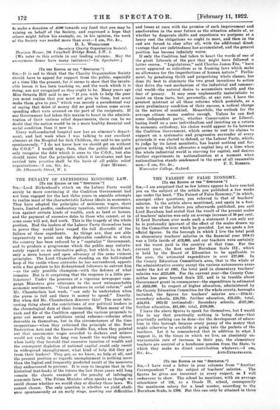THE PENALTY OF INFRINGING ECONOMIC LAW. [To THE EDITOR or
THE " SPECTATOR.") &a,—Lord Birkenhead's attack on the Labour Party would surely be more convincing if the Coalition Government had not been engaged for the last thiee years in amiable attempts to realize most of the characteristic Labour ideals in economics. They have adopted the principles of minimum wages, short hours, limited profits, confiscatory taxation, unfair discrimina- tion against certain kinds of wealth, such as land or houses, and the payment of excessive doles to those who cannot, or in some cases will not, find work. This is the tragedy of the whole position. Had the leaders of the Labour Party themselves been in power they would have reaped the full discredit of the
failure of these expedients. As things are, they are able impressively to point out the deplorable condition to which the country has been reduced, by a " capitalist " Government, and to produce a programme which the public may unfortu- nately regard as an alternative policy, but which is, in fact, only a more honest and open advocacy of the same ruinous principles. The Lord Chancellor standing on the half-ruined keep of the castle whose outworks he has surrendered, appeals with a fine gesture to his disheartened followers to entrust him —as the only possible champion—with the defence of what remains. But is it surprising that the response is a little per- functory? Under the pressure of a vigorous newspaper cam- paign Ministers give utterance to the most unimpeachable economic sentiments. "Great advances in social reform," said Mr. Chamberlain last week, "can only be undertaken When the purse is full and there is money to spend." Exactly. But when did Mr. Chamberlain discover this? The most inte- resting thing about the convictions of our political leaders is the chronological date of their formation. When .many of the rank and file of the Coalition opposed the various proposals to pour out money on ambitious social reforms—reforms often desirable in themselves, but in the circumstances of the time inopportune—when they criticised the principle of the Rent Restriction Acts and the Excess Profits Tax, when they pointed out that uneconomic wages awarded to dockers and miners would not really in the long run benefit the working classes, when lastly they foretold that excessive taxation of wealth and the consequent depletion of national capital could only result in widespread unemployment, what kind of help did they get from their leaders? They got, as we know, no help at all, and the present position as regards unemployment is nothing, more than the logical and frequently predicted result of the measures they endeavoured to prevent. It is easy to imagine that in the historical text-books of the future the last three years will long remain the classic example of the penalty of infringing economic laws. The Prime Minister often speaks as though we could choose whether we would olaey or disobey those laws. We cannot choose. The only question is .whether we yield .obedi- since spontaneously- at an early stage, meeting our difficulties
and losses at once with the promise of such improvement and amelioration in the near future as the situation admits of, or whether by desperate shifts and expedients we postpone at a heavy cost the obligations we ought to meet, and, then in the end are forced to obey after all, with the additional disad- vantage that our indebtedness has accumulated, and the general position has become infinitely worse.
If only the Coalition had taken to heart the words of one of the great Liberals of the past they might have followed a better course. "Legislatures," said Charles James Fox, "have never appeared so ridiculous as in framing laws which snake no allowance for the imperfections of human nature." Parlia- ment, by penalizing thrift and pauperizing whole classes, has done its best to eliminate the two great incentives to action that drive the vast mechanism of the industrial and commer- cial world—the natural desire to accumulate wealth and the fear of penury. It may seem unpleasantly materialistic to insist on these facts, but, personally, at any rate, I have the greatest mistrust of all those reforms which postulate, as a mere preliminary condition of their success, a radical change in the nature of mankind. Meanwhile, the outlook for the average citizen seems sombre enough. Unless he can find some independent party, whether Conservative or Liberal, basing itself on a sane individualism and insisting on a return to economic orthodoxy, his choice would appear to lie between the Coalition Government, which seems to rest its claims to support on a systematic and progressive surrender of every principle it was elected to defend, or the Labour Party, which, to judge by its latest manifesto, has learnt nothing and for- gotten nothing, which advocates a Capital levy at a time when the whole industrial world is starving for capital, and desires further experiments in nationalization at a moment when nationalization stands condemned in the eyes of all reasonable


































 Previous page
Previous page